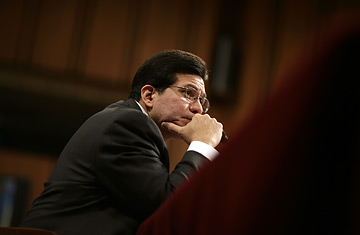
U.S. Attorney General Alberto Gonzales testifies about the firing of U.S. federal prosecutors before the U.S. Senate Judiciary Committee on Capitol Hill in Washington, April, 2007.
More than just a senior Administration official who oversaw the controversial firings of eight or more U.S. attorneys, Gonzales is a lawyer, subject to the rules of ethical conduct. And since most lawyers would probably look askance at a colleague who improperly sought the official signature of a seriously ill patient in the hospital, the more relevant question about Gonzales may be, did he break any ethical rules? And if he did, what would the consequences be?
The ethical cloud stems from the visit then White House Counsel Gonzales paid then Attorney General John Ashcroft back in March 2004, as former Deputy Attorney General James Comey testified to Congress earlier this week. President Bush needed the Attorney General's signature to reauthorize the administration's classified domestic wiretapping program. Trouble is, Ashcroft was in the hospital suffering from acute pancreatitis, and Acting Attorney General Comey refused to sign, because he didn't think the program was legal. So someone, quite possibly Bush, sent Gonzales and chief of staff Andrew Card rushing to Ashcroft's bedside in search of his signature. Comey got wind of this, reached Ashcroft first, and Gonzales and Card left empty-handed. (Bush, of course, went ahead with the program anyhow — after revising it and getting Justice Department sign-off — but that's another story.)
You could argue that all Gonzales did was zealously represent his client, the President. Gonzales apparently disagreed with Comey on the legality of the program, and he was just pressing his case to Ashcroft, albeit in a rather unseemly way. " The ethics rules let lawyers question each other's decisions," says Professor Nancy Rapoport, an ethics expert at the University of Houston law school. "It's just a little icky when you do it to someone who's in the hospital. But I don't think it rises to the level of anything that's actionable. I think it just fails the would-my-mom-be-proud-of-me test."
While Ashcroft may have been in no shape to sign an important document, Comey got to him first, and Ashcroft deferred to him, "so at worst it would be attempted misconduct," explains the University of Texas law school's Charles Silver.
The thing is, attempted misconduct is still wrong, and Gonzales probably shouldn't get off the hook so easily. He's a member of the Texas bar and subject to the Texas Disciplinary Rules of Professional Conduct. One of those rules says, "a lawyer shall not engage in conduct constituting obstruction of justice." The rule is based on the American Bar Association model rules, which refer to "Conduct prejudicial to the administration of justice". And since the Acting Attorney General — the arbiter of all things legal in the Administration — had already decided that the eavesdropping program as constituted was illegal, there's a good argument that Gonzales at least attempted to interfere with the administration of justice and perhaps, as the Texas rule puts it, to obstruct justice.
"The lawyer for the President was asking the head of the Department of Justice to approve an illegal program," says ethics expert Stephen Gillers, a professor at New York University law school. "By seeking to advance an illegal scheme, Gonzales seriously interfered with the administration of justice. It's hard to think of a clearer example of a violation of this rule."
Gillers also believes that Gonzales tried to deceive Ashcroft, because, according to Comey's testimony, he did not make it "crystal clear" that Ashcroft was being asked to sign off on a program that the Justice Department had already found to be illegal. The Texas disciplinary rules prohibit lawyers from engaging in "conduct involving...deceit." There's plenty of room to argue whether the eavesdropping program is, in fact, legal, or whether Gonzales at least believed at the time that that it was legal. But let's assume Gillers is correct. Now what?
Probably not much. Though anyone could file an ethics complaint against Gonzales, and a lawyer disciplinary committee could start poking around on its own, the reality is that state bars are neither bold nor swift. As Silver puts it, "I'd be astonished to find the Texas bar taking the lead."
In the few cases where a disciplinary committee did take action against a lawyer who was also president — Bill Clinton, for example —it went ahead only after the President left office. And serious discipline has to be approved by a court, which means that even if an ethics investigation started now, the process probably wouldn't play out until long after Gonzales had gone back to Texas.
In any event, the Attorney General doesn't face disbarment. According to Gillers, the maximum punishment would likely be a brief suspension from practicing law, something like 30 days, though he might also get reprimanded publicly. And assuming that either punishment came soon enough, what might it mean for Gonzales' future in the Administration? "I don't see how a person can serve as Attorney General under either circumstance," says Gillers.
